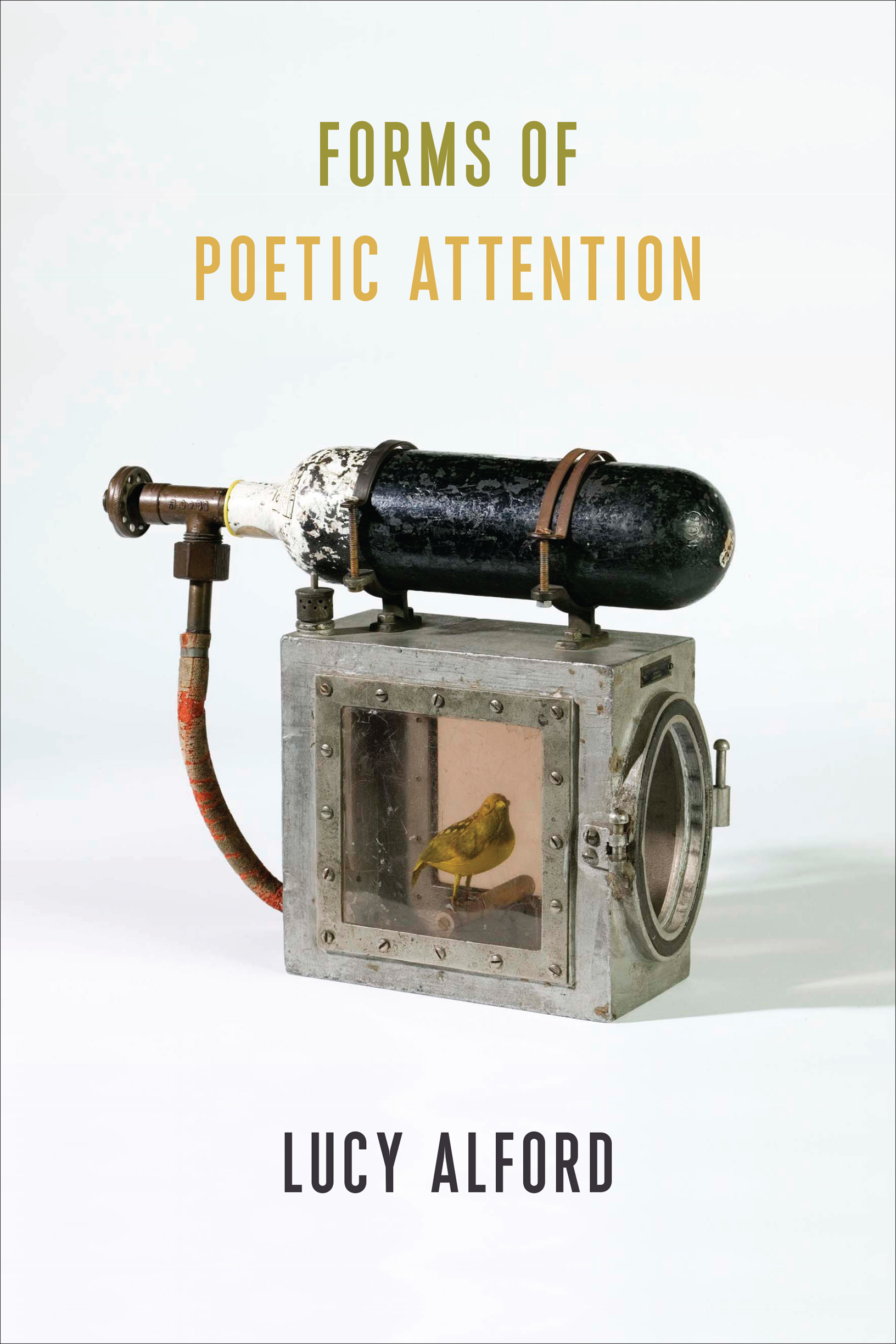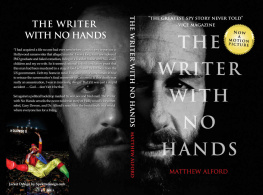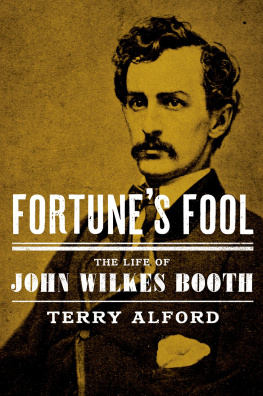Lucy Alford - Forms of Poetic Attention
Here you can read online Lucy Alford - Forms of Poetic Attention full text of the book (entire story) in english for free. Download pdf and epub, get meaning, cover and reviews about this ebook. publisher: Lightning Source Inc. (Tier 3), genre: Romance novel. Description of the work, (preface) as well as reviews are available. Best literature library LitArk.com created for fans of good reading and offers a wide selection of genres:
Romance novel
Science fiction
Adventure
Detective
Science
History
Home and family
Prose
Art
Politics
Computer
Non-fiction
Religion
Business
Children
Humor
Choose a favorite category and find really read worthwhile books. Enjoy immersion in the world of imagination, feel the emotions of the characters or learn something new for yourself, make an fascinating discovery.

- Book:Forms of Poetic Attention
- Author:
- Publisher:Lightning Source Inc. (Tier 3)
- Genre:
- Rating:3 / 5
- Favourites:Add to favourites
- Your mark:
- 60
- 1
- 2
- 3
- 4
- 5
Forms of Poetic Attention: summary, description and annotation
We offer to read an annotation, description, summary or preface (depends on what the author of the book "Forms of Poetic Attention" wrote himself). If you haven't found the necessary information about the book — write in the comments, we will try to find it.
Forms of Poetic Attention — read online for free the complete book (whole text) full work
Below is the text of the book, divided by pages. System saving the place of the last page read, allows you to conveniently read the book "Forms of Poetic Attention" online for free, without having to search again every time where you left off. Put a bookmark, and you can go to the page where you finished reading at any time.
Font size:
Interval:
Bookmark:

FORMS OF POETIC ATTENTION
Forms of Poetic Attention
Lucy Alford

Columbia University Press
New York
Columbia University Press
Publishers Since 1893
New York Chichester, West Sussex
cup.columbia.edu
Copyright 2020 Columbia University Press
All rights reserved
E-ISBN 978-0-231-54732-1
Library of Congress Cataloging-in-Publication Data
Names: Alford, Lucy, 1983 author.
Title: Forms of poetic attention / Lucy Alford.
Description: New York : Columbia University Press, 2020. | Includes bibliographical references and index.
Identifiers: LCCN 2019026948 | ISBN 9780231187541 (cloth)
Subjects: LCSH: PoetryHistory and criticism. | PoetryPsychological aspects. | Attention. | Cognition in literature. | Poetics.
Classification: LCC PN1031 .A435 2020 | DDC 808.1dc23
LC record available at https://lccn.loc.gov/2019026948
A Columbia University Press E-book.
CUP would be pleased to hear about your reading experience with this e-book at .
Cover image: Canary Resuscitator made by Siebe Gorman & Company Ltd. Museum of Science & Industry/Science & Society Picture Library
Cover design: Chang Jae Lee
For Roland Greene
This pen is where the writing flows in sight
the measuring eye follows line by line,
mouth set in the minds movement throughout at
tentive, tentative
Robert Duncan
The attentiveness a poem devotes to all encounters a concentration that stays mindful of all our dates.
Paul Celan
When you take up your
axe, listen. Hoofbeats. Wind.
It is they who make us at home
here, not the other way around.
Anne Carson
- Ponge : Heaney : Stevens : Bishop : Mullen
- Dickinson : Shakespeare : Lorde : Lowell : Oppen : Hass
- Al-Khans : Hill : Celan : Cha : Carson
- Coleridge : Wordsworth : Rilke : Burnside
- Hlderlin : Mallarm
- Rimbaud : Wright
- OHara : Ammons : Retallack
- Bukowski : Gunn : Eliot
A far-reaching community of scholars, poets, friends, and family has given generously to this book and to my writing life over many years. Indeed, so many minds and hands have shared in the conception, composition, and editing of this book, it has truly become an object of sustained co-attending and copoiesis in itself.
Stanford Universitys Division of Literatures, Cultures, and Languages provided a dynamic and supportive environment in which to write the first version of this book. First and foremost, I am indebted to Roland Greene for his wisdom and mentorship, brilliant feedback, and clarity of mind at every stage over many years. His thinking is present in every word of this book. As adviser and friend, Hans Ulrich Gumbrecht has both encouraged and modeled true intellectual independence; his thinking, particularly on the concepts of historical latency and Stimmung (mood, atmosphere), has been a deep source of inspiration to me. The first draft of my reading of Charles Wright in emerged as a paper for Gumbrechts graduate seminar on Stimmung. Joshua Landy has been a keen reader and a vital interlocutor on literatures formative capacities. Amir Eshel urged me to write the book I would like to read. This advice has stayed with me, and Ive done my best to follow it. David Palumbo-Liu has been a steadfast advocate and friend in countless ways, both to me and to this book. Special thanks to Lanier Anderson, Khalil Barhoum, Karl Heinz Bohrer, John Felstiner, Kenneth Fields, Marisa Galvez, Alexander Key, Patricia Parker, Nancy Ruttenburg, Ramzi Salti, Vered Shemtov, and, at Berkeley, Muhammad Siddiq. The Workshop in Poetics, led by Roland Greene and Nicholas Jenkins, offered an ongoing, anchoring community of poetic thinkers across periods, languages, and methodologies.
My colleagues and friends in Chicago have been heroic readers and interlocutors; our conversations brought clarity, precision, and depth to some very rough and drafty terrain. My fellow Fellows in the Society of Fellows in the Liberal Arts have offered rich interdisciplinary perspectives, both in conversation and workshop settings. Special thanks to Deborah Neibel for making everything happen. Mark Payne provided detailed feedback on the entire book, and I have returned again and again to his insightful commentary. Rosanna Warren has been a brilliant and generous mentor and friend on matters critical and creative. Epic conversations on the lyric with Christopher Davis at Northwestern have made my work and my life better. Special thanks to Marcello Barison, Alexis Becker, Aaron Benanav, Joshua Craze, Fred Donner, David Egan, Maud Ellmann, Rachel Galvin, Florian Klinger, Pablo Maurette, Franoise Meltzer, Benjamin Morgan, Sarah Nooter, Srikanth (Chicu) Reddy, Steven Rings, Naama Rokem, Lisa Ruddick, Michael Rutherglen, Eric Santner, Richard Strier, Christopher Taylor, Anna Elena Torres, Aaron Tugendhaft, Christopher Wild, and John Wilkinson. The Poetry and Poetics Workshop, the Comparative Literature Colloquium, and the Workshop of the Society of Fellows contributed an abundance of constructive feedback on my work in progress.
Christopher Fynsk, Adrienne Janus, and Nick Nesbitt at the University of Aberdeens Centre for Modern Thought oversaw the research that gave rise to this project. At the University of Virginia, Jahan Ramazani, Michael Smith, Lisa Russ Spaar, and Charles Wright have been my philosophical and poetic lighthouses. At Bard College, Thomas Keenan and Joan Retallack offered early and lasting inspiration and encouragement. Heartfelt thanks to Nura Yingling, Wendy Gavin, and Virginia Masterson, my first guides into poetry.
I am sincerely grateful for the work of my editor, Philip Leventhal: for his patience and clarity, his enthusiasm for this project from our first conversation, and his willingness to invest in an unconventional first book. The anonymous readers of my manuscript helped to guide my revision process and clarify blurry patches in my own thinking. Many thanks to Columbia University Press for bringing this book into the world, especially Susan Pensak, my production editor, and Monique Briones, editorial assistant, for their attentive behind-the-scenes work on this project, and Chang Jae Lee for his beautiful cover design.
My research has been made possible by a number of institutions and awards, many of which also provided a roof over my head and an intellectual community. Many thanks to the American Comparative Literature Association for selecting this book for the Helen Tartar First Book Subvention Award. At the University of Chicago, my work has been supported by the Society of Fellows in the Liberal Arts, the Bernard Weissbourd Memorial Fund, the College, and the Departments of English and Comparative Literature. Many thanks to the Ric Weiland Graduate Fellowship for two years of interdisciplinary community and financial support and to Theodore and Frances Geballe and the Stanford Humanities Center for the unforgettable year of writing and fellowship granted by the Geballe Dissertation Prize. This book also benefited from research opportunities provided by Amir Eshel, Brian Johnsrud, and the Poetic Media Lab at Stanfords Center for Spatial and Textual Analysis; the UVA-Yarmouk University Summer Arabic Program in Jordan; the Schlegelschule and the Dahlem Center for the Humanities at the Freie Universitt Berlin; and the Deutsches Literaturarchiv in Marbach.
Font size:
Interval:
Bookmark:
Similar books «Forms of Poetic Attention»
Look at similar books to Forms of Poetic Attention. We have selected literature similar in name and meaning in the hope of providing readers with more options to find new, interesting, not yet read works.
Discussion, reviews of the book Forms of Poetic Attention and just readers' own opinions. Leave your comments, write what you think about the work, its meaning or the main characters. Specify what exactly you liked and what you didn't like, and why you think so.






